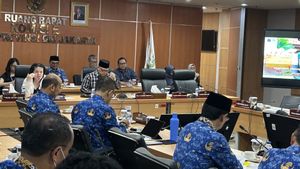JAKARTA - The Antimicrobial Resistency Control Committee (KPRA) of the Ministry of Health (Kemenkes) appealed to all residents not to just dispose of antibiotics that have expired to prevent river water pollution.
<quo; Yes, don't throw it away. That's dangerous because if it's in us, I'm afraid it will be used again. Our people still use river water, infiltration ground water is a lot,” said KPRA Chair Anis Kariwati in the WHO Media Gathering and FAO in Jakarta, Antara, Wednesday, October 12.
Anis emphasized that antibiotics should not be disposed of carelessly because of their content that can endanger the environment. Especially considering that most people in Indonesia have a life that depends on river water.
If an antibiotic liquid is mixed with river water, the content in the drug can affect animals or the environment around the river. When humans consume animals or process these natural products, it is feared that they can be infected or cause potential for antimicrobial resilience (AMR).
Anis added that the research and data related to the examination and treatment of hospital waste are still ongoing, so further monitoring takes time. In contrast to foreign countries, the water quality processing monitors the genes to get out of the river.
“ Although hospitals have many infectious patients with resistant bacteria, these are discarded. While the hospital waste has a waste management system, it turns out that from this examination the data is still piloted,” he said.
Therefore, Anis stated that education and socialization related to AMR must be intensified with the community immediately, considering that the impact of AMR actually lasts for a long time in the future.
Especially education related to increased vigilance, because viruses or bacteria around can do resistance naturally, although they have weak properties.
<quo;Actually bacteria will naturally be resistant. Bacteria, the virus even though weak creatures are given the ability to mutate compared to humans so that they survive in nature. So he is not doing anything with resistance, let alone doing anything,” he said.
Anis continued that the examination of the antimicrobial resistance was not actually necessary. This is because the human body from head to toe has a larger number of bacterial cells with cells owned by humans.
<quo;So many species (bacterial) are unknown, if we want to find it, it's difficult. If I'm swab because I like to meet patients, for example, there might be MRSA on my nose. So as long as we're healthy it's okay because it's really difficult to check or screen, yes,” he said.
The English, Chinese, Japanese, Arabic, and French versions are automatically generated by the AI. So there may still be inaccuracies in translating, please always see Indonesian as our main language. (system supported by DigitalSiber.id)








